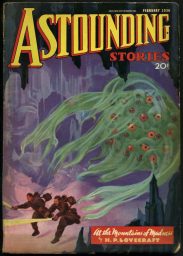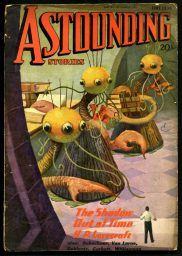The First People to Really Make Science Fiction Work
Saturday , 23, September 2017 Appendix N 39 CommentsThis crowdfunding pitch I came across via Cory Doctorow managed managed to lose me at the first sentence:
So Robert Heinlein is what we call one of the big three: Isaac Asimov, Arthur C. Clarke, Robert Heinlein. And those are the first people to really make science fiction work…
I suppose I should be happy with it. As much as you hear today about Mary Shelley inventing the science fiction novel, it maybe ought to be comforting hearing that people are still peddling yesterday’s narrative. But am I really supposed to believe that Jules Verne and H. G. Wells failed to really make science fiction work…? That A Princess of Mars and The Gods of Mars just… didn’t work…?
There are many others, to be sure… but I must say that it is particularly galling to be told that C. L. Moore failed to make science fiction work with her Northwest Smith stories. Show her work to someone that has been taught their entire life that science fiction really only started with Asimov, Clarke, and Heinlein and they’re liable to feel betrayed. She’s just that good.

 And then there’s this other guy you may have heard of, H. P. Lovecraft. He is a figure so tremendously influential, he is practically a genre unto himself. You don’t go into a game store and find figurines of Hari Seldon, Lazarus Long, or those pitiful alien creatures who went extinct when the Star of Bethlehem lit up the sky. No, you see games and toys and miniature figures based on the works of Lovecraft. Those other guys…? With the except of the stray Starship Troopers product, it’s just not there.
And then there’s this other guy you may have heard of, H. P. Lovecraft. He is a figure so tremendously influential, he is practically a genre unto himself. You don’t go into a game store and find figurines of Hari Seldon, Lazarus Long, or those pitiful alien creatures who went extinct when the Star of Bethlehem lit up the sky. No, you see games and toys and miniature figures based on the works of Lovecraft. Those other guys…? With the except of the stray Starship Troopers product, it’s just not there.
I’m not sure who decided that Lovecraft doesn’t count as science fiction that works… but the editor of one of the leading science fiction magazine of the thirties had no problem making him the cover story.
Evidently there’s been some narrowing of the terminology. But why…? For most people, something like Star Wars is synonymous with science fiction. And it’s absolutely nothing like the work of Asimov, Heinlein, and Clarke. No, it hearkens back to the work of writers like Edgar Rice Burroughs and later writers that took him as the starting point for what science fiction even was. Writers such as Leigh Brackett who would end up writing the first draft of the script for The Empire Strikes Back.
And it’s not just in film that it’s like this. In role-playing games, Asimov, Heinlein, and Clarke really are nothing special. The “big three” of Gamma World and Metamorphosis Alpha are Andre Norton, Brian Aldiss, and Sterling Lanier. The “big three” of Traveller are guys like H. Beam Piper, E. C. Tubb, and Poul Anderson.
So who decided that Asimov, Heinlein, and Clarke are the end all be all of science fiction…? If they really were as big and as influential as I’m told, I would expect to see their influence to have more of an impact wherever science fiction is invoked. But that’s just not what happens. Don’t get me wrong. They wrote some mighty good stuff. But compared to the real giants of the field, they are little more than a flash in the pan.
What’s interesting is I think by this they mean later Heinlein– sprawling narratives that are all over the map, overly verbose, where not much goes on and there’s lots of weird sex fantasies, as that’s what most of this crowd is into.
If you look at a lot of Heinlein’s really great work like Rocket Ship Galileo, Double Star, etc. I bet they won’t give it much of the time of day.
But yes, it’s a pretty insulting statement to several great authors.
Let’s see, van Vogt got pushed out of the limelight as did Hubbard over Scientology, Kuttner and Moore left science fiction for more profitable writing (as did Brackett, Hamilton Asimov, and Clarke). Campbell pushed out the professional writers for true-believers and hobbyists because the latter were more amenable to writing his ideas instead of their own, and the former found that stories written for Campbell had no market elsewhere.
In short, no one in the Campbelline vein figured out how to make this science fiction thing work and make money off of it at the same time.
I keep hearing people mock the “Frankenstein was the first science fiction novel” thing, and I don’t know why.
The best I can tell is that people are firm that fantasy and sci-fi are the same thing or inseperable (I get the arguments; I approve of genre mashing; I don’t buy it), and don’t believe in counting Frankenstein as any sort of break in tradition.
But after reading some of John C. Wright’s work on the subject it seems pretty clear that it was doing something different.
Plus, it is a pretty good and very influential book.
But I suppose I get that it is often unfairly used as part of the push to sweep the pulp guys out of the picture.
-
Fantasy and Science Fiction are inseparable. The idea that they are two separate categories was formed from the ideological atheist worldview.
There’s a video of Damon Knight where he compares Lucian’s True History to Elijah being taken to heaven in a whirlwind. He acts as if the Bible is a work of fiction akin to The Wizard of Oz. The idea that modern science is above the fantastic and the miraculous not only goes against the Christian worldview, but also the very history of science itself.
-
Fantasy and Science Fiction are inseparable. The idea that they are two separate categories was formed from the ideological atheist worldview.
I’d agree if I couldn’t see the differences pretty easily.
-
Sci/Fi and Fantasy are polar opposites. “Classic” Sci/Fi is nothing more than a reactionary materialistic philosophy, it is the antithesis of Fantasy. It is anti-human.
-
-
I read a few articles discussing how Science Fiction originated in Ancient Times and that it was a combination of Ancient Science and Epic Fantasy.
Aren’t Asimov, Heinlein, and Clarke; considered the Big Three of Science Fiction because they were the most influential of the Silver Age Writers? On the subject of Age, what came after the Silver Age in Science Fiction History?
I’m a bit of a Heinlein fan-boi, but not even I think he was the first to make SF work. Obviously since all 3 gentlemen were fans first, others made it work before they did.
Clarke wasn’t a Campbellian author and didn’t subscribe to Campbell’s vision of SF. He descends from the bleaker tradition of H.G. Wells. Bradbury was the forerunner of New Wave. The real third of the Big Three was A.E. van Vogt.
-
There is often this mystical element to his work, something that definitely isn’t Campbellian.
As for bleakness, I think that is what made him so appealing from New Wave onwards… “Childhood’s End” combines radical collectivism and cosmic pessimism, so it is no wonder that leftists are attracted to it like flies are to honey.
What about British pre-WW2 SF authors, some of whom actually achieved “serious” literary acclaim even back then? Folks like Stapledon.
Mary Shelly wrote horror/myth, not Sci/Fi, that’s why she’s still read. She may have been a poor writer, but she was an awesome mythologist. Her work outlives her contemporaries Percy Shelly, Mary Wollstonecraft, and William Godwin. Likewise, Arthur, Isaac, and Bobby are little read while Howard, Burroughs and Lovecraft live on. Time the best .
Cory Doctorow should concentrate on writing better books. Everything since “Down and Out in the Magic Kingdom” has been awful.
“Makers” was atrocious and shouldn’t have been longer than 100 pages.
